| Article ID | Journal | Published Year | Pages | File Type |
|---|---|---|---|---|
| 6268721 | Journal of Neuroscience Methods | 2014 | 11 Pages |
â¢We examine the impact of heart rate variation on fMRI during the Stroop and ToL task.â¢Both tasks show significant task-related changes in heart rate.â¢The fMRI BOLD signal shows significant sensitivity to these changes in heart rate.â¢However, fMRI main task effects are marginally influenced by the heart rate changes.â¢We conclude that heart rate changes do not impact strongly on fMRI task effects.
fMRI signals during rest are strongly correlated with heart rate variations. These heart rate/fMRI associations may influence the results of brain activation studies, particularly if heart rate is affected by the task. To assess the contribution of task-related heart rate changes on fMRI brain activation related to executive processing, we co-registered the electrocardiogram with fMRI in 91 subjects during an interference task (color-word Stroop) and during a planning task (Tower of London; ToL). We found that both Stroop interference and ToL planning significantly increased heart rate in the scanner and confirmed significant main effects of heart rate regressors on the fMRI signals. Nevertheless, statistical contrasts that test for increased fMRI during Stroop interference and ToL planning were not significantly influenced by inclusion of heart rate regressors. We conclude therefore that fMRI changes associated with heart rate changes do not impact strongly on higher-order fMRI effects in these commonly used executive function tasks, but routinely adding a correction seems prudent.
